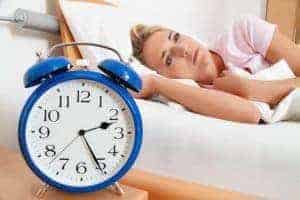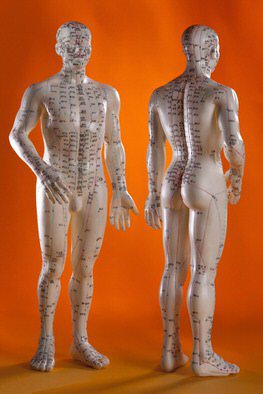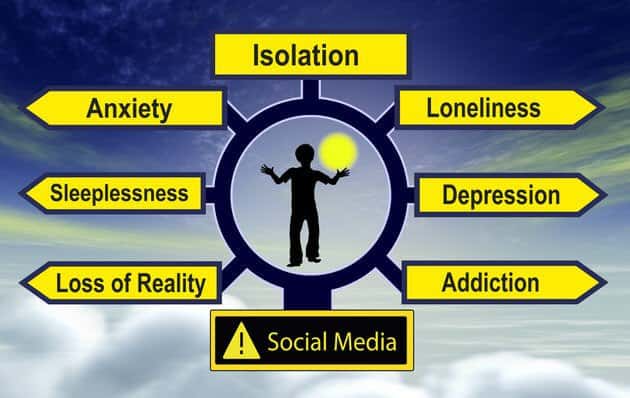
So you find it hard to fall asleep. And you suffer from anxiety problems. Well did you know that there is a common connection between anxiety and insomnia?
I bet you are surprised to hear that.
It is a bad situation and having insomnia and anxiety can turn into a vicious cycle. You need to be doing something about it if you want to get a good night’s sleep on a regular basis.
What can you do to help yourself? There is research that proves that by treating your insomnia you will handle anxiety symptoms much better.
How To Know If You Have Insomnia.
If you have sleeping problems for more than a month, then you have chronic insomnia. This causes you major difficulties in falling soundly asleep.
If you eventually do fall asleep, you will have problems remaining asleep. Or you may just feel that the overall quality of your sleep is deteriorating over time.
How Big Is The Problem?
Take the United States for example. Millions of people there are affected by sleep problems. Around 10 percent of the population suffers from sleeping difficulties.
Chronic insomnia is terrible for your overall well-being. So make an appointment to see your family doctor first. People with insomnia report a lower quality of life compared with people who sleep well. Insomnia is one of the most common symptoms patients report to their doctors.
Because chronic insomnia can indicate that there is another health problem present it is likely that this could be an underlying sign of other health issues.
According to the National Institutes of Health, most cases of chronic insomnia are secondary, meaning they are side effects or symptoms resulting from another primary problem.
We don’t always know what causes insomnia though identifying the cause is important in helping to determine the most effective treatment, but many factors can precipitate this lack of sleep. Anxiety and insomnia make it hard to sleep and cause insomnia.
The most commonly prescribed medications are sleep aids, but often these will not work because the cause of insomnia is anxiety. Studies found that depressed patients with insomnia who received treatment with both an antidepressant and a sleep medication did better than those treated only with antidepressants.
Therefore, insomnia seems to be essential for the treatment of all anxiety subtypes, whether it be through a direct association, an indirect association with depression, or the consideration of particular risk factors, such as being a night owl. Insomnia caused by mental health conditions will usually not improve or go away until you treat the disorder.
Some Medical Conditions Associated With Insomnia.
- Heart disease
- Diabetes
- Pregnancy
- Menopause
- Arthritis
- Epilepsy
These can all cause sleeping problems, and you should examine them so you can rule them out.
Of course, anxiety or stress can also cause you sleep problems. If for example, you are nervous, upset, or anxious you may not be sleeping soundly.
But if you take measures to deal with your anxiety or depression it will help your sleeping pattern eventually. Anxiety and insomnia make it hard to sleep so here are some ways you can help yourself.
Foods That Can Add To Both Anxiety and Insomnia.
- Tea
- Coffee
- Soft drinks
- Chocolate
These are all offenders and will cause you problems. At least try to avoid them before going to bed. Even some medications contain caffeine so examine any you are taking to see if they do. Ask your doctor for alternatives if there are any. It goes without saying that smoking is a no-no. If you smoke and have anxiety or insomnia, then you need to quit.
Quitting would help your overall health in so many positive ways too. Did you realize Nicotine raises your blood pressure? Did you know that? When your blood pressure increases your heart rate increases too, and nicotine also excites the functioning of your brain. No wonder it can be so difficult to get a good night’s sleep.
Many people resort to drinking a glass or two of wine before bed. While it may help you fall asleep, you will not sleep soundly, and it won’t be long before you are awake. When you wake, you will feel tired and groggy. You know what I mean if you ever tried it.
And the worst part is trying to get back asleep. Sometimes you may not even manage to, so avoid alcohol before bedtime. If you find it hard to fall back asleep, try a relaxation technique like visualization, progressive muscle relaxation, or meditation, which you can do without even getting out of bed.
Foods To Help You Sleep.
Many foodstuffs can help you get a good night’s sleep. The foods to look out for should include calcium, B vitamins, and magnesium.
Exercise Can Help With Anxiety and Insomnia.
Do you exercise enough? Or do you exercise at all? Now is the time to plan an exercise routine. Even short daily walks can help your overall state of health and help promote sleep at night. Try to aim for at least twenty minutes a day. It is good for your mental state as well and will help you relax. Try walking near the sea or forest if possible, and avoid noisy environments.
But do not exercise too near bedtime. Exercising will stimulate your brain and body, the last thing you need when trying to fall asleep. To begin with, the aim is to walk two or three times a week. Anxiety and insomnia make it hard to sleep but walking regularly will help prevent that and help you get asleep later on.
Your Bedroom Environment:
Examine your room and make sure you have it as dark as you can and free from distractions like a bright light from a television or outdoor street lamps. If you are not able to do that consider putting on a sleep mask at nighttime. Make sure your room temperature is neither too hot nor too cold. Sleep with the window open if at all possible if it is hot.
Some people find it useful to go to bed with their window open a little, when feasible.
How To Get Help When Anxiety And Insomnia Make It Hard To Sleep
Cognitive behavioral therapy patients learn to adjust their attitudes and develop more positive beliefs about sleep, overcoming stressing thoughts and behaviors that keep them awake.

A specialist may suggest sleep-promoting medications, lifestyle changes, cognitive behavioral therapy for insomnia, or a combination of all three.
Relaxation training techniques for the body and mind include progressive muscle relaxation, yoga, guided imagery, and biofeedback.
Once you have every part of your body slack and relaxed, just breathe evenly as your mind relaxes into sleep along with your body.
Alone in bed, people will think, thinking may trigger anxiety, stress triggers adrenaline, and adrenaline triggers lack of sleep.
To fall asleep, your mind needs to be calm and clear to help your body slow down and prepare for sleep.
Once every part is slack and relaxed, just breathe evenly until your mind relaxes into sleep along with your body.
Try to improve your emotional, mental and physical balance during the day, so you’re prepared for restful sleep at night.
Eventually, you will deal better with anxiety and insomnia, and your life will be much improved. The effects of insomnia on daily life will fade away. Now you know why anxiety and insomnia make it hard to sleep and what to do about it.
Do you think you can overcome the problem? Please leave a comment below.